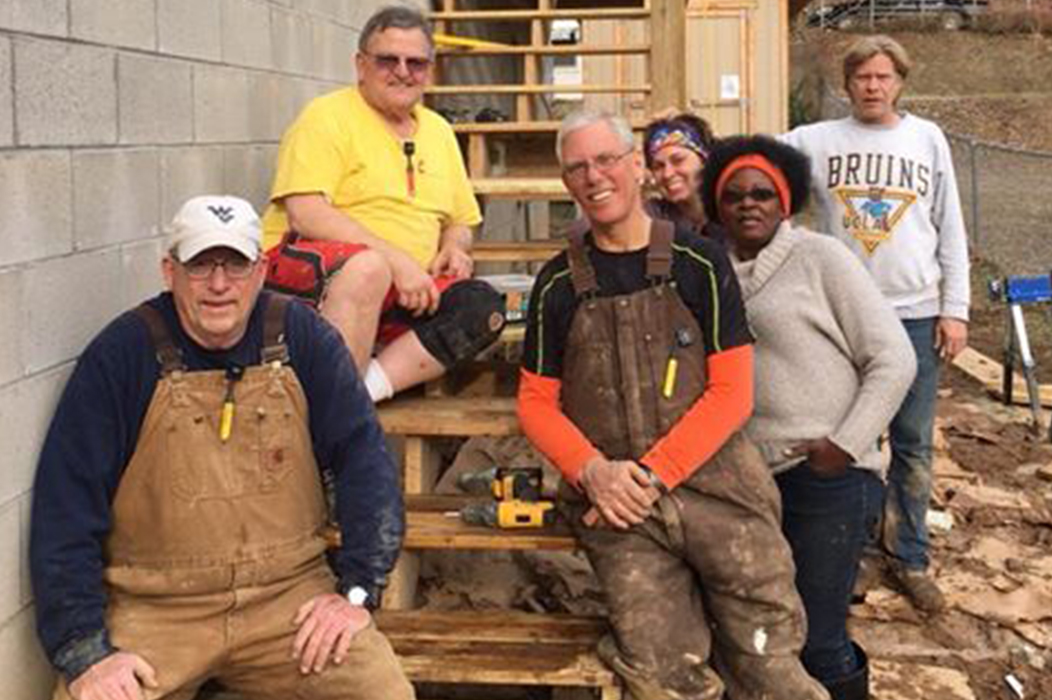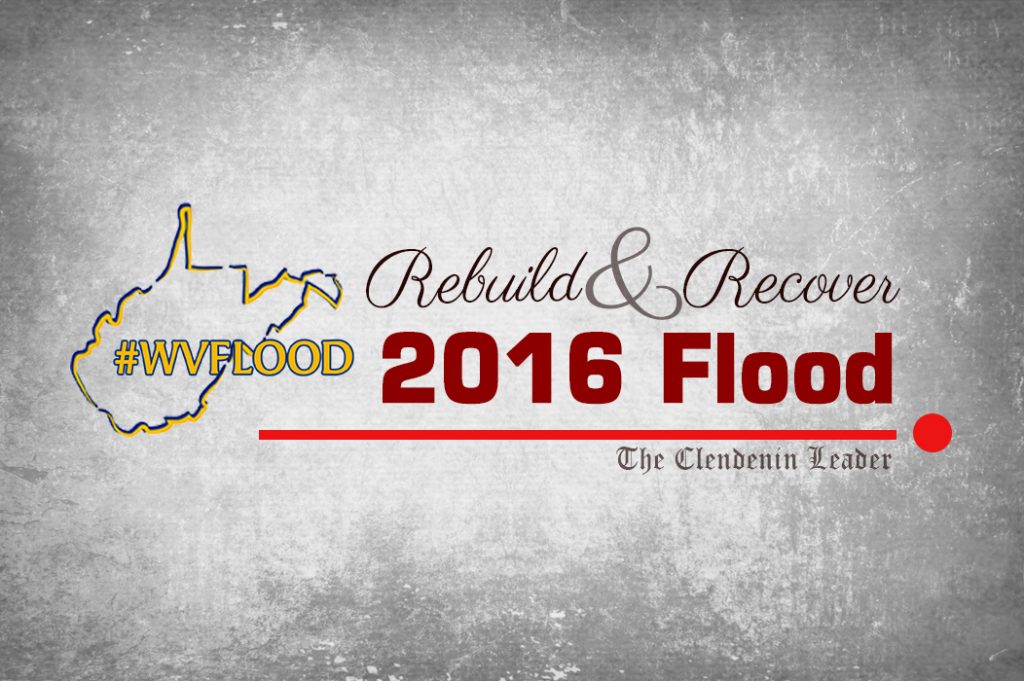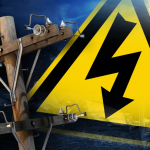By: Jack Lipphardt | Posted: May 28, 2018 | Source: WV Gazette-Mail

Disaster Recovery team members of the West Virginia Conference of the United Methodist Church pause during work on Feb. 9 at a flood-affected home in Clendenin. Pictured from left are Construction Coordinator Buck Edwards, WVCUMC Director of Disaster Recovery the Rev. Jack Lipphardt, “A New Vision with Hope” Executive Director J.F. Lacaria, case managers Miranda Nabers and Grace Msisha and Construction Coordinator Chad Faris. Courtesy Photo
Thank you for your editorial Friday, May 25 regarding the failure of RISE West Virginia to keep its promises to survivors of the storms and flood disaster of June 23, 2016, as well as to the United Methodist Church of West Virginia and our ecumenical and secular partners.
I hope your essay helps in moving RISE West Virginia from its stagnant dormancy to the promises made. From increasing and more frustrating conversations with our disaster recovery partners, particularly those of us active with funding, volunteer work teams and disaster case management, I know the United Methodist Church is not alone having trusted what we were told by RISE West Virginia, West Virginia Development Office officials and the consulting firm of Horne LLC while disaster survivors have been told to wait — and wait.
We were thrilled to hear that the U.S. Department of Housing and Urban Development, through the Community Development Block Grant program, would provide $104 million for disaster recovery. As news unfolded, the amount increased to $150 million.
It was a mystery to me why this important grant was lodged in the Development Office in the state’s Commerce Department, where there is no organizational motivation to address disaster recovery and no one with any experience or expertise in disaster response. The Resiliency Board is composed of eight people, but do any of them have any knowledge or experience in disaster recovery? Have they met?
At a meeting held June 15, 2017, at the Sports Performance Center at The Greenbrier resort, people from the Development Office and the consulting firm excitedly described the RISE West Virginia program and provided training for disaster case managers, including our United Methodist disaster case managers. They provided iPads programmed to provide easy intake for client referrals to RISE. At the meeting, we were given details of the grant and how it would be used.
Those of us present that day were told that 1,000 homes would be built in the 12-county disaster zone (80 percent in the counties of Greenbrier, Clay, Nicholas and Kanawha) in less than a year.
We were also told that RISE expected to serve 600 to 800 households. That math doesn’t work very well, but I report to you what we were told to indicate the magnitude and efficiency of work that was promised: 1,000 houses to be built, preferably by local construction contractors, in less than a year.
Numerous other details were provided, including Social Vulnerability Index priorities, single-family home construction or rehab, mobile-home replacement, elevation remediation, temporary rental assistance and flood insurance.
We were told the first houses would be under construction in August 2017. Then came the delay to September. Then October. Christmas passed with no RISE activity.
On Feb. 5 of this year, after numerous concerns were raised about RISE’s delays and requirements that make no sense, given West Virginia’s sociology and geography, a meeting was held at the Clay County Courthouse to discuss this. I attended, along with ecumenical and other partners, because we were being embarrassed by RISE, being caught in the web of RISE’s delays.
We further wanted to let the citizens who attended know what we were doing to assist recovery apart from and in spite of RISE. Representatives from the offices of Sen. Manchin, Sen. Capito, Congressman Mooney and FEMA were present. A staff member of the Development Office assured everyone present that, during that month, February, 50 homes would be under construction. When pressed about that number, he said that 30-some for sure would be under construction.
To date, not one house has had construction begin. I understand that two mobile homes have been placed, but are neither set up nor yet habitable.
In Roane County, I can point to three RISE applicants who are held up for unexplainable reasons, all three elderly women, two in their 70s and one 85. Ecumenical and voluntary organizations have been told by RISE West Virginia not to spend donated dollars on projects that RISE could take. This is a fast-growing immorality, as we see it, keeping people from recovery while HUD and RISE fool around with this.
One of my case managers has a large family whose house was destroyed in Kanawha County. The Elk River undercut the land where their home sat. Their lot stretches up the hill from the precise site of the former home. RISE West Virginia has told them it will not build unless it is on the exact previous site, which is now consumed by the reformed river’s edge.
With generous gifts from three Charleston United Methodist churches to fund their new house, and with help from our friends with Mennonite Disaster Services who will provide the labor to build it, we will see to their recovery.
Our other case manager has a person in Nicholas County whose house was destroyed by the flood but which now has mine drainage washing the site. As with the case above, a new house could be built on his land farther up the hill from the house that was destroyed, but RISE has disqualified him because he does not want to live in a house that RISE would build on the mine-drainage-affected former house footprint.
As I write this, the United Methodist Church has begun construction to care for this survivor and get him into a home on suitable land that is his.
Our United Methodist case managers have other clients who have been disqualified by RISE’s crippling rules or are caught in the unconscionable and strangling delays. To reiterate, we are not alone with this problem that is affecting ecumenical and secular partners, especially our survivor families.
The West Virginia United Methodist Church, our ecumenical partners and other volunteer organizations have been active since day one, from early response to recovery, and continue to move forward to help survivors move from untenable, dangerous situations into residences that are safe, secure and sanitary. We hope for the day when RISE West Virginia executes its promises.
Jack Lipphardt, mayor of Wheeling from 1992 to 2000, was senior pastor of Johnson Memorial United Methodist Church. After the June 2016 floods, he has been director of West Virginia United Methodist Disaster Recovery.








